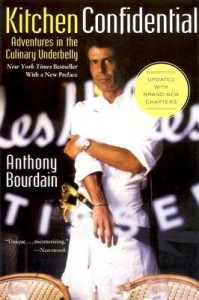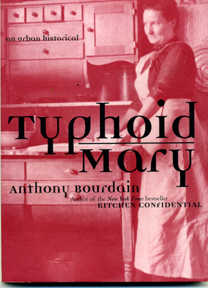I watched a different kind of episode of celebrity chef Anthony Bourdain’s Travel Channel show, “No Reservations” yesterday. It was a re-run, but since I’m not a regular watcher, I hadn’t seen it before. And it was really interesting.
Why? Because it was less about food and Bourdain’s chefdom than it was about his career as a professional writer. If you’ve lived under a rock for several years, or are simply not a foodie, you may not be aware that Bourdain is an accomplished author as well as a successful restaurateur. His debut work, a half-memoir, half-exposé titled Kitchen Confidential: Adventures in the Culinary Underbelly, was a surprise success, both to the author and the book industry. He’s had an admirable string of successful books since then.
It’s not my point here to review or describe these books, but to bring up a point that every writer should be hyper-aware of: Voice matters. Bourdain says he believes he’s a better chef than a writer, so I’d love to taste his food, because my God, this guy can write.
You know he writes his own TV scripts, because they are so evocative of his own personality: incisive, witty, detail-oriented observations of whatever locale he’s visiting, the people he meets, the cuisines he experiences. And “experiences” is the operative word here, because that’s what makes Bourdain, Bourdain. He fully engages all senses in every single thing he does. And the very able writer in him shares these experiences with engaging, compelling prose packed with his singular descriptive, appreciative and often caustic narrative.
True to full-on Chef Mode, he’s got an ego the size of Montana, for which he doesn’t apologize. But his writing, whether TV script, book or magazine article, keeps this from becoming tedious because his narrative is often self-deprecating. He’s not averse to making himself the butt of the joke, often citing some foible or perceived character flaw in himself. This device also has the effect of bringing him down to our level, the “just an average joe” who’s doing the best he can despite himself. You get the feeling he’s just ever-so-slightly uncomfortable with all the accolades and attention, yet all the time fully aware of how lucky he is to have these things.
On camera, Bourdain is the jokester, the preternatural pre-teen always testing the boundaries of good taste with potty humor and sexual references. If you watch closely, you can see just the wee-est little bit of shyness and discomfort in front of the camera. He can’t hide his constant underlying surprise that people are so interested in what he has to say about food and people the world over. Beneath the tough, New York City veneer, you can see an awestruck kid who made lots of bad choices growing up and still came out on top, but expects each minute that it will be his last as a star. It’s as though he knows this whole celebrity thing is just a house of cards, one puff away from collapsing and leaving him back in the kitchen to his own devices. The effect is both enlightening and endearing. But it’s the voice-overs that give the show — and his books — their real impact.
His commentary lifts the edge of his ego so we can peep inside at the soul of an essentially decent, compassionate man with a curious mind and an artist’s soul. It works because Bourdain writes exactly the way he speaks. Sure, he might don the chef’s coat for appearances, but he doesn’t gussy up his words with more syllables than he’d ever use in real life. He doesn’t affect a new author vocabulary. All the bodily function references and gross-out visual descriptions he clearly uses so frequently keep him honest, grounded in his reality, offering the viewer/reader his absolute here-I-am-love-me-or-leave-me attitude and worldview.
Whenever I watch his show, I bounce back and forth between “God, this guy is full of himself!” to “God, this guy can write!” And the telling thing is that I always come back for more.
Bourdain admitted in yesterday’s episode that he never “agonizes over craft” in writing. He doesn’t need to. He’s not reaching for literary immortality. But his use of voice and language is so uniquely his own, I posit that his writing is at least as exciting and evocative as that of many classic novels.
I will likely never read Bourdain’s foodie or travel books. But he’s got a novel out and a nonfiction docu-drama about Typhoid Mary. I may just have to pick those up, because ego or not (and let’s face it — what author doesn’t have one?), this guy is a refreshing, entertaining and accomplished writer whose voice another writer could learn a lot from.

